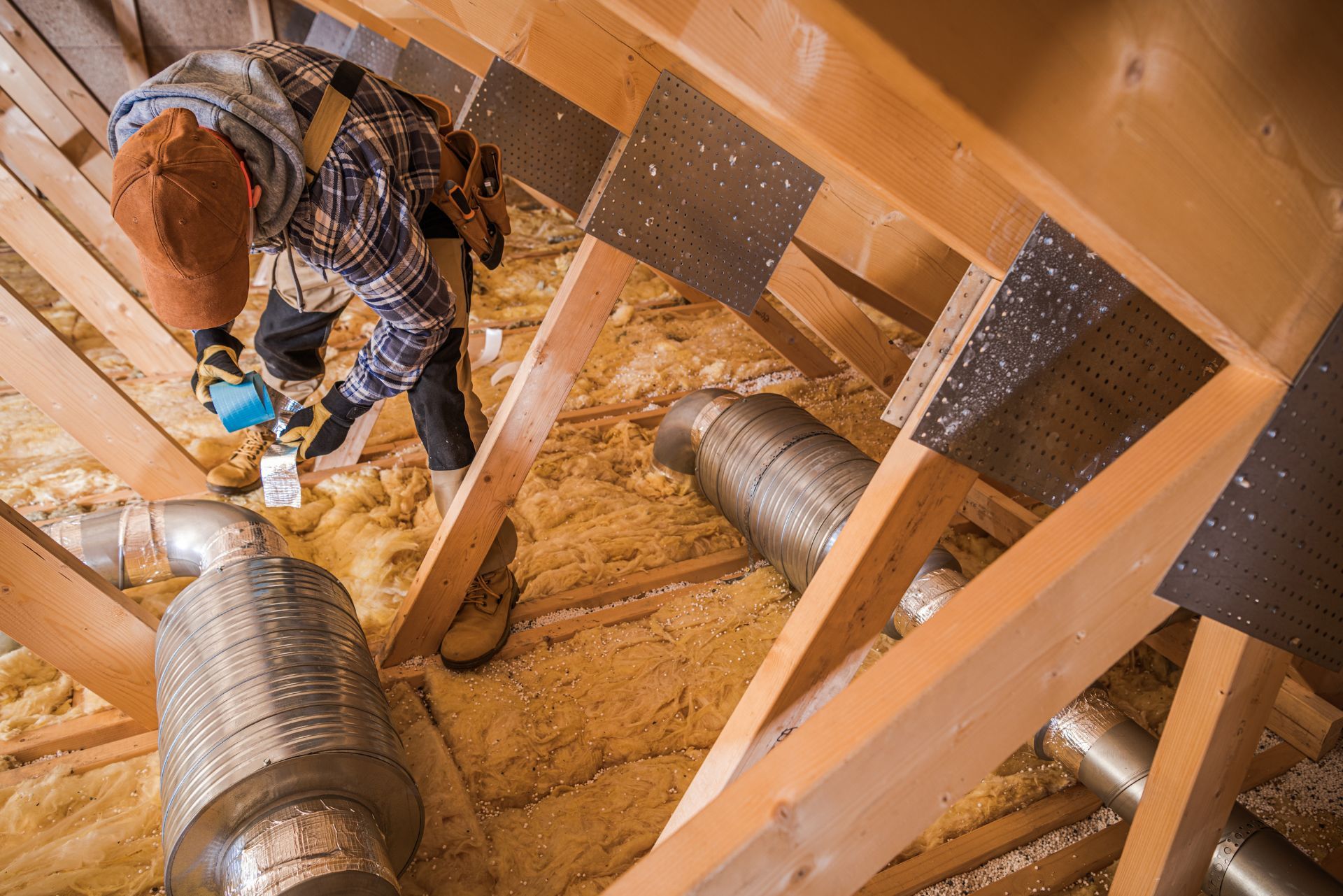South Carolina Insulation Contractor Insurance

9:00am - 5:00pm Mon-Fri
Will Reply in 15min*
Index
Contact Us
Phone
864-626-6181
service@southerninsured.com
Location
5 Century Drive Suite 130 Greenville, SC 29607
810 Dutch Square Boulevard, Suite 123 Columbia, SC 29210
When it comes to running a successful insulation contracting business in South Carolina, understanding the nuances of insurance is crucial. Insulation contractors face a unique set of risks, from property damage to worker injuries. This article aims to provide a comprehensive overview of the various types of insurance available to insulation contractors in South Carolina, the legal requirements, and how to choose the right coverage for your business.
Understanding the Basics of Contractor Insurance
Insurance is a vital component of any business, providing financial protection against unexpected events. For insulation contractors, having the right insurance can safeguard against potential liabilities that may arise during the course of their work. The construction industry is fraught with risks, and without proper insurance, a single incident could jeopardize the entire operation, leading to significant financial loss and damage to reputation.
What is Contractor Insurance?
contractor insurance is a broad term that encompasses various types of coverage designed specifically for contractors. This insurance can protect against claims related to bodily injury, property damage, and other risks associated with the construction industry. For insulation contractors, this may include coverage for accidents that occur on job sites, damage to client property, and even legal fees arising from disputes. Additionally, contractor insurance can also cover the costs associated with delays in project completion, which can be particularly critical in maintaining client relationships and ensuring repeat business.
Types of Insurance for Insulation Contractors
Insulation contractors should consider several types of insurance to ensure comprehensive coverage. The most common types include:
- general liability insurance: This covers third-party claims for bodily injury and property damage. It is essential for protecting your business against lawsuits that may arise from accidents on the job site. This type of insurance not only shields your financial assets but also enhances your credibility with clients, as it demonstrates a commitment to professionalism and safety.
- Workers' Compensation Insurance: Required by law in South Carolina, this insurance provides benefits to employees who suffer work-related injuries or illnesses. It covers medical expenses and lost wages, ensuring that your workers are protected. This coverage is crucial not only for compliance with legal requirements but also for fostering a safe work environment that prioritizes employee well-being.
- Commercial Auto Insurance: If your business uses vehicles for transportation, this insurance covers damages and liabilities related to accidents involving those vehicles. Insulation contractors often transport heavy materials and equipment, making this coverage essential to mitigate risks associated with vehicle-related incidents.
- professional liability insurance: Also known as errors and omissions insurance, this covers claims related to professional mistakes or negligence in your work. Given the technical nature of insulation work, this insurance can protect against claims stemming from design flaws or inadequate installation, which can lead to costly repairs and dissatisfied clients.
Furthermore, insulation contractors may also want to explore additional coverage options such as equipment insurance, which protects against loss or damage to tools and machinery essential for their work. This type of insurance can be particularly beneficial, as the cost of replacing specialized equipment can be significant. Additionally, considering environmental liability insurance might be prudent, especially for contractors involved in projects that could impact the environment, as it provides coverage for claims related to pollution or environmental damage.

Legal Requirements for Insulation Contractors in South Carolina
In South Carolina, insulation contractors must adhere to specific legal requirements regarding insurance coverage. Understanding these regulations is essential for compliance and to avoid potential penalties. The insulation industry, like many others, is subject to a variety of legal standards that ensure both the safety of workers and the quality of service provided to clients. Navigating these requirements can be complex, but it is crucial for maintaining a successful business.
Workers' Compensation Insurance
South Carolina law mandates that all businesses with four or more employees must carry workers' compensation insurance. This requirement protects employees by providing necessary medical care and compensation for lost wages due to work-related injuries. Contractors who fail to obtain this insurance may face fines and legal repercussions. In addition to the legal implications, having workers' compensation insurance fosters a safer work environment, as it encourages contractors to prioritize employee safety and adhere to best practices in insulation installation. Furthermore, it can enhance a contractor's reputation, as clients often prefer to work with companies that demonstrate a commitment to their workers' well-being.
General Liability Insurance
While general liability insurance is not legally required, it is highly recommended for insulation contractors. Many clients will request proof of insurance before hiring a contractor, making it a vital part of securing contracts. Additionally, having this coverage can protect your business from costly lawsuits and claims. General liability insurance covers a range of potential issues, including property damage and bodily injury that may occur during the course of a project. This protection not only safeguards the contractor's financial stability but also instills confidence in clients, who are often wary of the risks associated with home renovations and improvements. Moreover, some clients may even stipulate insurance coverage as a prerequisite in their contracts, further emphasizing the importance of having this coverage in place.
Choosing the Right Insurance Coverage
Selecting the appropriate insurance coverage for an insulation contracting business can be a daunting task. However, understanding your specific needs and risks can simplify the process.
Assessing Your Risks
The first step in choosing the right insurance is to assess the unique risks associated with your business. Consider the following factors:
- The size of your business and the number of employees
- The types of insulation services you provide
- Your client base and the nature of your projects
- Your business's financial situation and ability to absorb potential losses
Additionally, it's crucial to think about the environmental factors that may impact your operations. For instance, working in older buildings might expose your team to hazardous materials like asbestos, which can lead to serious health risks and legal liabilities. Furthermore, consider the geographical location of your projects; areas prone to natural disasters may require specialized coverage to protect against unexpected events such as floods or hurricanes. By thoroughly evaluating these aspects, you can better prepare for the potential challenges your business may face.
Consulting with Insurance Professionals
Working with an insurance agent or broker who specializes in contractor insurance can provide valuable insights. These professionals can help identify the best coverage options tailored to your specific needs and ensure compliance with South Carolina laws.
Moreover, a knowledgeable insurance professional can assist you in understanding the nuances of different policies, such as general liability, workers' compensation, and commercial auto insurance. They can also guide you through the claims process, ensuring that you are well-prepared in the event of an incident. Building a strong relationship with your insurance agent can lead to ongoing support and advice as your business evolves, allowing you to adjust your coverage as necessary.
Comparing Insurance Quotes
Once you have a clear understanding of your needs, it’s time to gather quotes from various insurance providers. Comparing quotes allows you to evaluate coverage options, premiums, and policy limits. Be sure to read the fine print and understand any exclusions or limitations in the policies you are considering.
In addition to price, consider the reputation of the insurance companies you are evaluating. Look for reviews and testimonials from other contractors to gauge their experiences with claims handling and customer service. A lower premium may not be worth it if the insurer has a history of poor claims support. Additionally, inquire about any discounts that may be available for bundling policies or maintaining a safe work environment, as these can significantly impact your overall costs while ensuring you have the necessary protection in place.
Cost of Insulation Contractor Insurance
The cost of insurance for insulation contractors can vary widely based on several factors, including the size of the business, the types of coverage selected, and the contractor's claims history.
Factors Influencing Insurance Costs
Several key factors can influence the cost of insurance for insulation contractors:
- Business Size: Larger businesses with more employees typically face higher premiums due to increased risk exposure.
- Claims History: A history of frequent claims can lead to higher insurance costs, as insurers may view the business as a higher risk.
- Type of Work: The nature of the insulation work performed can impact premiums. Riskier projects may result in higher costs.
- Location: The geographic area where the business operates can also affect insurance rates. Areas with higher rates of accidents or claims may see increased premiums.
Average Insurance Costs
While costs can vary, insulation contractors in South Carolina can expect to pay anywhere from $500 to $2,500 annually for general liability insurance, depending on the factors mentioned above. Workers' compensation insurance costs can also vary, averaging around $1.25 to $2.00 per $100 of payroll.
In addition to the basic coverage options, insulation contractors may also want to consider specialized policies that cater to their unique needs. For instance, equipment insurance can protect against loss or damage to tools and machinery essential for insulation work, which can be a significant investment. Furthermore, professional liability insurance is another critical consideration, as it covers claims arising from errors or omissions in the contractor's work, ensuring that the business is protected from potential lawsuits stemming from dissatisfied clients.
Moreover, the insurance landscape is constantly evolving, with new regulations and market conditions influencing premiums. Insulation contractors should stay informed about industry trends and consider working with an insurance broker who specializes in contractor insurance. This can provide valuable insights into available coverage options and help identify potential discounts, such as bundling multiple policies or maintaining a clean claims history, which can significantly lower overall costs.

Common Insurance Claims for Insulation Contractors
Understanding the types of claims that insulation contractors commonly face can help in selecting the right coverage and preparing for potential risks. The insulation industry, while vital for energy efficiency and comfort in buildings, is not without its challenges. Contractors must navigate a landscape filled with potential liabilities, making it crucial to be informed about the various insurance claims that can arise in the course of their work.
Property Damage Claims
Property damage claims often arise when insulation work results in damage to a client's property. This could include accidental damage to walls, ceilings, or other structures during installation. General liability insurance typically covers these claims, protecting the contractor from financial loss. Additionally, it’s important for contractors to maintain clear communication with clients about the scope of work and any potential risks involved. This proactive approach can help mitigate misunderstandings and reduce the likelihood of disputes that may lead to claims.
Moreover, contractors should consider conducting thorough site assessments before beginning any project. By identifying pre-existing conditions and documenting them, insulation contractors can further protect themselves against claims related to property damage. This diligence not only fosters trust with clients but also serves as a safeguard against potential legal issues that could arise from miscommunication or oversight.
Injury Claims
Injuries on the job site are another common issue for insulation contractors. Whether it’s a slip and fall accident or an injury from equipment, these incidents can lead to costly claims. Workers' compensation insurance is essential for covering medical expenses and lost wages for injured employees. However, it’s equally important for contractors to implement rigorous safety protocols and training programs to minimize the risk of accidents on-site. Regular safety meetings and the use of personal protective equipment (PPE) can significantly reduce the likelihood of injuries, thereby protecting both workers and the contractor’s bottom line.
In addition to traditional safety measures, contractors should also stay updated on industry regulations and best practices. This knowledge not only helps in creating a safer work environment but can also be beneficial in defending against claims should an incident occur. By demonstrating a commitment to safety and compliance, insulation contractors can enhance their credibility and potentially lower their insurance premiums over time.
Contract Disputes
Disputes with clients over project scope, quality of work, or delays can lead to legal claims. Professional liability insurance can help cover legal fees and settlements related to these disputes, providing an essential layer of protection for insulation contractors. To further safeguard against such claims, it is advisable for contractors to draft detailed contracts that clearly outline the expectations, timelines, and responsibilities of all parties involved. This clarity can prevent misunderstandings and provide a solid foundation for resolving any issues that may arise during the project.
Additionally, maintaining open lines of communication throughout the project can help address client concerns before they escalate into disputes. Regular updates and check-ins can reassure clients that their project is on track and that their needs are being met. By fostering a collaborative relationship with clients, insulation contractors can not only improve customer satisfaction but also reduce the risk of claims stemming from contract disputes.
Best Practices for Managing Insurance
Regularly Review Insurance Policies
Insurance needs can change as a business grows or as projects evolve. Regularly reviewing insurance policies ensures that coverage remains adequate and relevant. This practice can help identify gaps in coverage and allow for adjustments as needed.
Implement Safety Protocols
Establishing and enforcing safety protocols on job sites can significantly reduce the likelihood of accidents and injuries. Providing training for employees on safety practices not only protects workers but can also lead to lower insurance premiums over time.
Maintain Accurate Records
Keeping detailed records of projects, employee training, and safety inspections can be beneficial when filing claims or renewing insurance policies. Accurate documentation can help prove compliance with safety regulations and demonstrate a commitment to risk management.
Conclusion
Understanding the intricacies of insulation contractor insurance in South Carolina is essential for protecting your business and ensuring compliance with legal requirements. By assessing risks, choosing the right coverage, and implementing best practices, insulation contractors can safeguard their operations against potential liabilities. Investing time and resources into proper insurance management not only protects the business but also enhances its reputation and reliability in the marketplace.
In a competitive industry, having the right insurance coverage can be the difference between success and failure. By staying informed and proactive, insulation contractors can navigate the complexities of insurance with confidence.






